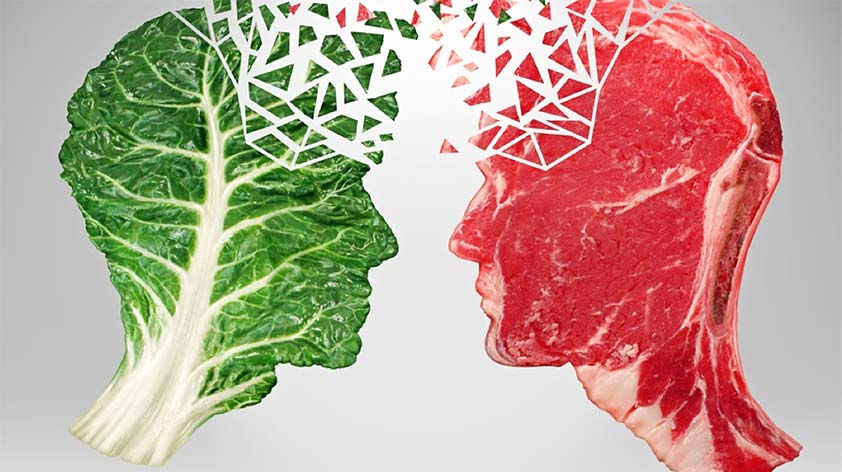To Meat or not to Meat; that is the question
- Hungry4Fitness

- Jun 26, 2020
- 7 min read
Updated: Oct 2, 2020
A case against the consumption of meat in three parts: health, environmental, moral

Mortals, do not defile your bodies with sinful eating.
You have the crops to sustain you, the fruit which forces the
branches
to bend down under its weight, the grapes that swell on the
vine,
scented herbs and vegetables that fire can soften.
- Pythagoras
John Maynard Keynes once said: When the facts change, I change my mind. Thus when the scientific research demonstrating the detrimental impacts of meat on health began pouring in I adopted a vegetarian diet.
I then serendipitously stumbled on the China Study – arguably the most comprehensive study yet conducted on how diet impacts health. Once I’d waded through Dr Collin T. Campbell’s great literary libation I changed my diet again. Now, from Monday to Friday, I practice veganism and on the weekends I let my hair down and enjoy a free range egg, poached, on toast, no butter.
But as I’ve found, to my frustration (because I’m a health and fitness practitioner who teaches diet and lifestyle to incredulous carnivores), things aren’t so clear cut and there is a lot of contradictory information being disseminated. One minute meat is the root of all evil, the next minute it’s fine in moderation – and around and around we go ad infinitum.

This can make it quite the challenge to know what to do, whose advice to follow, which diet plan to adopt – that’s if you haven’t got the inclination or time to invest in the many hours required to research so nebulous a subject.
The way I see it, because I have got the inclination and I make the time to do the research, when it comes to meat/animal food consumption the answer to the title question is very simple: NOT TO eat meat and cut-out all animal protein; dairy and fish included.
Now before you get all irate and start shouting at me about how humans have been eating meat for thousands of years and that ‘My Aunt Winnie ate her meat and two veg all her natural life and she lived to the ripe old age of a hundred and two,’ I ask that you read the rest of this article and then conduct some research. Once you’ve satisfied these two reasonable requests then, and only then, do you get to rebut and refute my assertion.
The Detriments of Eating Meat in Three Parts
Part One: Human Health
If you could condense a piece of research into, say, a 1 kilogram weight, and then place each weight on a set of scales, one side designated ‘for’ and the other side ‘against’ meat consumption, the against would out-weigh the for by about 500 to 1.
Nowadays arguing against the detriments of meat consumption on human health is comparable to maintaining that the earth is flat, global warming is a myth or that the link between lung cancer and smoking lacks credibility.
In his exceptionally well researched book, How Not to Die, Michael Greger MD., provides us with a staggering wealth of scientific research that empirically supports the presupposition that animal food consumption deteriorates health.
Instead of trawling through 400-plus pages picking out studies that substantiate the central premise of this argument, I’ve selected one piece of research which looks at how organic pollutants build up in meat and find their way onto YOUR plate, into YOUR digestive system and then, ultimately, stored in YOUR flesh. This should come as no surprise; after all, we truly are what we eat.
On page 237 of How Not to Die Gregor discusses the rather disconcerting concept of cannibalistic feed biomagnification: ‘Millions of tons of slaughterhouse by-products,’ he says, ‘continue to be fed to farm animals. . . . Not only have we turned these animals into meat eaters but virtual cannibals as well. When we feed farm animals millions of tons of meat and bonemeal, we’re also feeding them any pollutants [heavy metals and antibiotics] this feed may contain. Then, after those animals are slaughtered, their trimmings go to feed the next generation of farm animals, potentially concentrating the pollutant levels higher and higher. . . . When we eat these farmed animals, it’s almost as if we’re also eating every animal they ate.’
If this alone doesn’t discourage you from eating meat then you may be beyond reason. However, I won’t give up on you just yet. Let’s turn to
Part Two: Environmental Impacts
‘The globalization of agriculture systems over recent decades is likely to have been one of the most important causes of overall increase in greenhouse gas emissions.’
(Naomi Klein 2016)
This may come as surprise to many but it is now largely acknowledged by environmental scientists that the global agribusiness, that is the industrialisation of rearing and slaughtering animals for human consumption, contributes more to greenhouse emissions than all automotive transportation combined.
Did you know that to produce 1kg of meat it requires 15kg of grain and 15,000 litres of clean water?
A few thousand years ago man and his animals made up less than a percent of the world’s biodiversity. Today we make up over 98%. This has led to the decimation of the natural ecology. ‘Forest clearing for new pastureland is a major source of deforestation. In Latin America, 70 percent of former Amazon rainforests has been given over to grazing. As the “lungs of the Earth,” these forests are vital to removing greenhouse gasses from the atmosphere’ (John A. McDougal, MD 2016). Eating meat is not only killing us, but it is also killing our planet.
Are you convinced yet? If not I have one final reason that may tip the balance.
Part Three: Moral
Eating meat is immoral. Those people who eat meat are not only harming their own health and contributing to the accelerated degradation of the planet, they are also causing animals to suffer needlessly. Modern day agribusiness, to meet the ever increasing demand, has moved to the industrialisation of animal slaughtering. As some reporters have uncovered (see Kentucky Fried Cruelty and The Cowspiracy), this has led to some horrific animal husbandry abuses.
Do you have any idea of how many animals are killed each year for human consumption? ‘Each year we kill sixty billion chickens, one billion sheep, and three hundred million cows globally, in circumstances that are often barbaric’ (Jones, 2018). In total that’s 61,300,000, 000.
We all know about battery hens, where thousands upon thousands of chickens are crammed into, what can only be described as agricultural concentration camps, and made to suffer in a seething cesspit of faeces and decaying carcasses – when finally, after thirty weeks of existing in these disgusting conditions, they are electrocuted and boiled. But few are aware that the same kind of barbaric practice is now being extended to all other animals which are reared for human consumption.
Peter Singer, in his book Ethics in the Real World, has this to say of modern agribusiness: ‘In today’s factory farms, pregnant sows are kept in creates so narrow that they cannot turn around, or even walk more than a step forward or a step backward. . . . Beef cattle spend the last six months of their lives in feedlots, on bare dirt, eating grain that is not suitable for their digestion, fed steroids to make them put on more muscles, and antibiotics to keep them alive.’
I believe that if those people who eat meat were to spend an hour in the same conditions as these animals they would be so disgusted by the ‘established barbarous habit’ that they would certainly make the transition to the much healthier alternative.
It is my sincere hope that this article has encouraged those who consume meat to reconsider their current dietary practices. If you decide to follow in the footsteps of the millions of people who have moved to a vegetarian diet you will improve your health, the health of the planet and contribute, however small it may be, to the reduction in animal suffering.
Suggested reading list (for more information on any of the books click the image)
How Not to Die (Michael Gregor, MD)
How Not To Diegives effective, scientifically-proven nutritional advice to prevent our biggest killers - including heart disease, breast cancer, prostate cancer, high blood pressure and diabetes - and reveals the astounding health benefits that simple dietary choices can provide.
China Study (Dr Collin T. Campbell)
The science is clear. The results are unmistakable. You can dramatically reduce your risk of cancer, heart disease, and diabetesjust by changing your diet. More than thirty years ago, nutrition researcher T. Colin Campbell and his team at Cornell, in partnership with teams in China and England, embarked upon the China Study, the most comprehensive study ever undertaken of the relationship between diet and the risk of developing disease.
The Starch Solution (John A. McDougal, MD)
Fear of the almighty carb has taken over the diet industry for the past few decades--from Atkins to Dukan--even the mere mention of a starch-heavy food is enough to trigger an avalanche of shame and longing. But the truth is, carbs are not the enemy!
This Changes Everything (Naomi Klein)
Forget everything you think you know about global warming. It's not about carbon - it's about capitalism. The good news is that we can seize this crisis to transform our failed economic system and build something radically better.
Ethics in the Real World (Peter Singer)
In Ethics in the Real World, Singer shows that he is also a master at dissecting important current events in a few hundred words. In this book of brief essays, he applies his controversial ways of thinking to issues like climate change, extreme poverty, animals, abortion, euthanasia, human genetic selection, sports doping, the sale of kidneys, the ethics of high-priced art, and ways of increasing happiness
(As we are very interested in user feedback at Hungry4Fitness, I would be very grateful if you could take a few seconds out of your day to leave a comment. Thanks in advance!)
Blog Author
Adam Priest is a former Royal Marines Commando, professional personal trainer, lecturer, boxing and Thai boxing enthusiast
References
Greger. M (2017): How Not to Die.
Jones. G (2018) Quote taken from the Philosophy Now article entitled: Moral Blind Spots.
Klein. N (2014). This Changes Everything. United States. Penguin.
McDougal. J (2013) The Starch Solution.
Pythagoras’ quote is taken from Ovid’s Metamorphoses. This is a Penguin Classics copy and it was published in London (2004).
Singer. P (2016). Ethics in the Real World. United Kingdom. Princeton.
Final quote ‘established barbarous habit’ is taken from Nikola Tesla’s My Inventions (a Penguin publication). In full he has this to say of meat eating: ‘On general principals the raising of cattle as a means of providing food is objectionable, because, in the sense interpreted above, it must undoubtedly tend to the adition of mass of a “smaller velocity.” It is certainly preferable to raise vegetables, and I think, therefore, that vegetarianism is a commendable departure from the established barbarous habit. That we can subsist on plant food and perform our work even to advantage is not a theory, but a well-demonstrated fact. Many races living almost exclusively on vegetables are of superior physique and strength,’ (My Inventions (p111)).
_p.png)



Comments